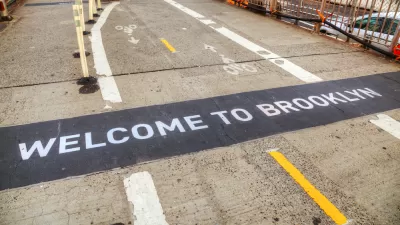Matt Bevilacqua looks at the real story behind headlines making news this week regarding the "fastest-gentrifying neighborhoods in the United States."
This week, The Atlantic Cities and The Washington Post both picked up on a story featured in the blog of the Thomas B. Fordham Institute, a non-profit think tank dedicated to education policy. The post, written by Mike Petrilli, the organization's executive vice president, "culled Census data and made a list of the top 25 ZIP codes in the country that have seen the largest increases in the percentage of white residents between 2000 and 2010" to develop a chart of what he called "the fastest-gentrifying neighborhoods in the United States."
Although the data gathered by Petrilli - "who readily admits that his expertise lies in education, not demographics" - includes some significant information, Bevilacqua rightly points out that the post's core conceit, that "more
white people automatically translates to gentrification," deserves to be challenged.
As Bevilacqua explains, "Undoubtedly, race and class in the U.S. are linked in a
complex and pretty irretrievable way. Nonetheless, they're not one in
the same. Washington, D.C. has seen an influx of middle-class black
residents whose presence has changed the economic landscape of certain
traditionally low-income neighborhoods - or, to put it another way, black gentrifiers. As the New York Times reported several years ago, this has even happend [sic] in Harlem."
"Which
isn't to say that gentrification is wholly about socioeconomic status
to the exclusion of race, either. (For an interesting take on just how
central race is to the topic, check this March 2011 blog post
by Kenyon Farrow.) It's just that any responsible discussion on
something as divisive and widely misunderstood as gentrification
shouldn't fail to take a comprehensive look at the issue."
FULL STORY: Gentrification: Not Only About White People

Planetizen Federal Action Tracker
A weekly monitor of how Trump’s orders and actions are impacting planners and planning in America.

Maui's Vacation Rental Debate Turns Ugly
Verbal attacks, misinformation campaigns and fistfights plague a high-stakes debate to convert thousands of vacation rentals into long-term housing.

San Francisco Suspends Traffic Calming Amidst Record Deaths
Citing “a challenging fiscal landscape,” the city will cease the program on the heels of 42 traffic deaths, including 24 pedestrians.

Defunct Pittsburgh Power Plant to Become Residential Tower
A decommissioned steam heat plant will be redeveloped into almost 100 affordable housing units.

Trump Prompts Restructuring of Transportation Research Board in “Unprecedented Overreach”
The TRB has eliminated more than half of its committees including those focused on climate, equity, and cities.

Amtrak Rolls Out New Orleans to Alabama “Mardi Gras” Train
The new service will operate morning and evening departures between Mobile and New Orleans.
Urban Design for Planners 1: Software Tools
This six-course series explores essential urban design concepts using open source software and equips planners with the tools they need to participate fully in the urban design process.
Planning for Universal Design
Learn the tools for implementing Universal Design in planning regulations.
Heyer Gruel & Associates PA
JM Goldson LLC
Custer County Colorado
City of Camden Redevelopment Agency
City of Astoria
Transportation Research & Education Center (TREC) at Portland State University
Jefferson Parish Government
Camden Redevelopment Agency
City of Claremont




























